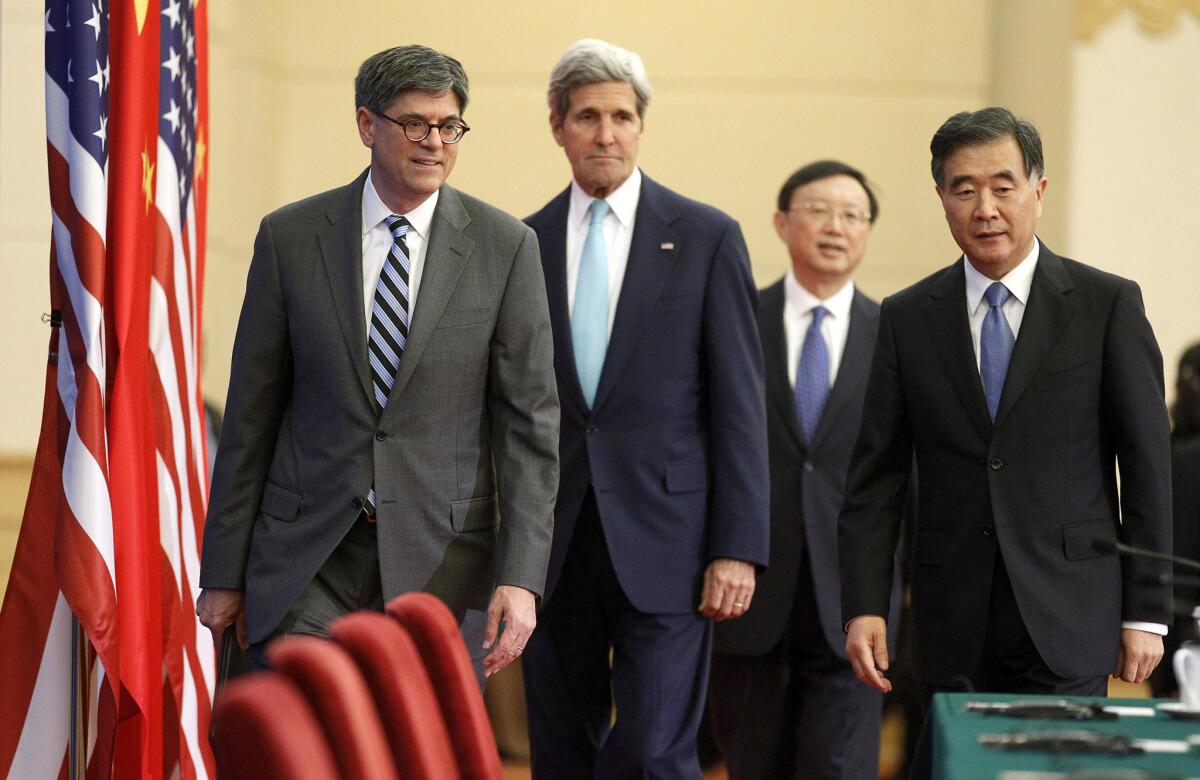U.S. and China say they ‘narrowed differences’ in Beijing talks

U.S. and Chinese officials said Thursday that they had “narrowed differences” during two days of high-level, wide-ranging talks on issues including cyber-security, climate change, foreign exchange rates, economic reforms and bilateral investment.
Although the two sides said they had “reached over 90 important outcomes,” no new major agreements had been expected, and no surprise breakthroughs were announced.
With relations between Washington and Beijing noticeably frosty these days -- thanks to matters ranging from espionage allegations to regional maritime disputes -- the mere chance to stem the increasing negativity in a face-to-face forum may have been the most significant aspect of the gathering in Beijing.
Secretary of State John F. Kerry and Treasury Secretary Jacob Lew participated in the discussions, known as the China-U.S. Strategic and Economic Dialogue, with Chinese State Councilor Yang Jiechi and Vice Premier Wang Yang. This is the sixth time the talks have been held since 2009.
Alluding to the recent strains in Sino-U.S. ties, Kerry said Thursday in closing remarks with the three other leaders that one of Washington’s “clearest and most compelling interests” is to develop a “positive and constructive” relationship with China.
“How we manage and grow this relationship will define not only the future of our two nations in our work together, but also greatly impact the possibilities for peace and prosperity in the Asia Pacific region and around the world,” said Kerry, who also met with President Xi Jinping during the trip.
Just a few months after Xi took over China’s presidency, he and President Obama met in Sunnylands, Calif., in June 2013 for a shirtsleeves summit that was hailed by both sides as the beginning chapter in “a new type of Great Power relationship.”
But translating that momentous pronouncement into something substantive has proved a struggle. The case of former National Security Agency contractor Edward Snowden exploded into the public realm the same month, and his flight to Hong Kong -- and his disclosures of rampant U.S. government surveillance programs -- immediately set the Beijing-Washington relationship on edge again. Snowden, who faces U.S. charges of leaking classified information, has taken refuge in Russia for more than a year.
Tensions have continued to mount over China’s moves to project its power in the South China Sea, angering U.S. allies. Rifts in China’s relations with Japan, a major U.S. ally, have added to the troubled U.S.-Sino ties.
Kerry sought to use this week’s forum to nudge the U.S.-China relationship back on track, arguing that the two nations were not on an inevitable collision course, even as China’s economic and military might grows.
“Let me be clear: China’s success is profoundly in the interest of the United States. We seek a partnership that benefits the citizens of both of our countries, our neighbors and the world,” he said. “We seek a relationship defined not by strategic rivalry, but by practical cooperation on common challenges and constructive management of differences where our interests diverge.”
It was apparent, nevertheless, from the four participants’ closing remarks where some of the key strains remain.
Kerry said the two sides had a “frank exchange” on cyber issues, though it was unclear whether the recent U.S. indictment of five Chinese army personnel on cyber-espionage charges was discussed directly.
“Incidents of cybertheft have harmed our businesses and threatened our nation’s competitiveness,” Kerry said.
Yang countered, warning the U.S. against a hypocritical or confrontational approach.
China, he said, “believes that cyberspace should not become a tool for damaging the interests of other countries. The Chinese side hopes that the U.S. side would create conditions for the two sides to have dialogue and cooperation on the cyber issue.”
There was no indication that the two countries would restart a working group on the issue that was suspended after the indictments.
On matters of Asian maritime disputes, Yang also urged Washington to, in essence, butt out. The U.S., he said, should “adopt an objective, just position and honor its commitment of not choosing sides and play a constructive role in maintaining peace and stability in this region.”
Yang said China and the U.S. had agreed to strengthen cooperation on counter-terrorism, law enforcement and military-to-military relations, though few details were immediately forthcoming.
Kerry and the others sought to highlight increasing levels of cooperation between the two countries over other issues as well, including the nuclear capabilities of North Korea and Iran, climate change and fighting wildlife trafficking.
For news from China, follow @JulieMakLAT on Twitter
More to Read
Sign up for Essential California
The most important California stories and recommendations in your inbox every morning.
You may occasionally receive promotional content from the Los Angeles Times.











